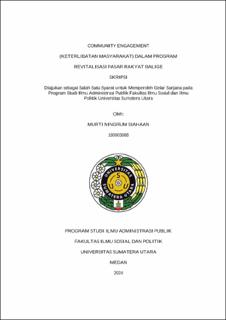| dc.contributor.advisor | Sihombing, R Sally Marisa | |
| dc.contributor.author | Siahaan, Murti Ningrum | |
| dc.date.accessioned | 2024-12-17T07:57:39Z | |
| dc.date.available | 2024-12-17T07:57:39Z | |
| dc.date.issued | 2024 | |
| dc.identifier.uri | https://repositori.usu.ac.id/handle/123456789/99495 | |
| dc.description.abstract | Revitalization of public markets is one of the programs of trade policy with the aim of changing negative perceptions and empowering the community so that the market is more optimal achieve its strategic functions. The revitalization of the Balige public market has not yet achieved this goal due to problem in community engagement. Market traders who where not fully engaged, especially in decision making, resulted in market development policies did not meet the needs of market traders, resulting in rejection, conflict, and distrust from some market traders towards the local government. This study aims to describe in detail community engagement in the revitalization of the Balige market.
The research method used is descriptive research with a qualitative approach. Data collection was carried out by interview, observation, and documentation techniques. The data were obtained and analyzed qualitatively with the community engagement theory by Vargas including genuine community involvement: building community strength, building trust, horizontal relationships and empowerment through co-leadership and participatory processes.
The results showed that genuine community engagement: building on the Strength of the community not used a bottom-up approach with policies that only utilize land assets and balerong cultural heritage. Building trust between the government and market traders and among market traders has not been achieved with a commitment to market trader involvement by only carrying out six socializations and two public hearing meetings as well as lack of intervention for traders needs. Horizontal relationships have not been implemented due to a cooperative culture and reciprocal relationships have not been established. Empowerment of market traders was not implemented where market traders were not involved in participatory processes in decision-making and in important task forces. Community engagement has not been optimally implemented as a decision-making strategy in the Balige public market revitalization program. | en_US |
| dc.language.iso | id | en_US |
| dc.publisher | Universitas Sumatera Utara | en_US |
| dc.subject | Community Engagement | en_US |
| dc.subject | Market Revitalization | en_US |
| dc.subject | Balige Public Market | en_US |
| dc.title | Community Engagement (Keterlibatan Masyarakat) dalam Program Revitalisasi Pasar Rakyat Balige | en_US |
| dc.title.alternative | Community Engagement in The Balige Public Market Revitalization Program | en_US |
| dc.type | Thesis | en_US |
| dc.identifier.nim | NIM190903088 | |
| dc.identifier.nidn | NIDN0003017705 | |
| dc.identifier.kodeprodi | KODEPRODI63201#Ilmu Administrasi Publik | |
| dc.description.pages | 176 Pages | en_US |
| dc.description.type | Skripsi Sarjana | en_US |
| dc.subject.sdgs | SDGs 11. Sustainable Cities And Communities | en_US |


